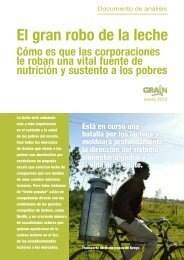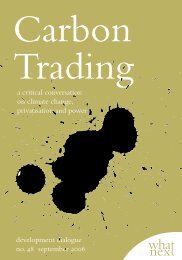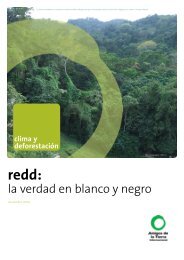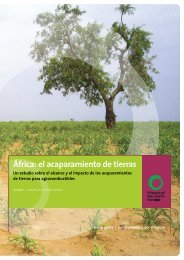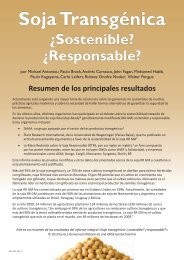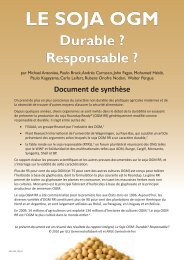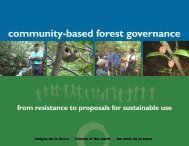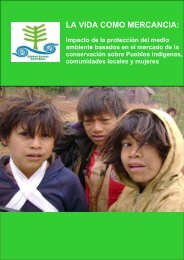Plantations, poverty and power - Critical Information Collective
Plantations, poverty and power - Critical Information Collective
Plantations, poverty and power - Critical Information Collective
Create successful ePaper yourself
Turn your PDF publications into a flip-book with our unique Google optimized e-Paper software.
128<br />
pesticides, fungicides <strong>and</strong> herbicides to prevent <strong>and</strong> control outbreaks of pests <strong>and</strong> diseases. Plantation<br />
managers often also rely on chemical fertilizer to achieve faster growth rates.<br />
FSC’s position on genetically modified trees is confusing. Criterion 6.8 is clear: “Use of genetically<br />
modified organisms shall be prohibited.” But as with many of FSC’s st<strong>and</strong>ards, the problem is in the<br />
implementation of the Criterion. Can an FSC certified company carry out laboratory research into GE<br />
trees Can it carry out field trials in areas that are not certified Can it finance research into GE trees by<br />
universities or other research institutions In October 2007, the US-based Stop GE Trees campaign wrote<br />
to Heiko Liedeker, FSC’s then-director, with copies to all Board members, requesting clarification on<br />
these questions. FSC declined to reply.638<br />
Criterion 6.9 is almost completely meaningless in the context of large-scale industrial tree plantations<br />
planted with exotic species: “The use of exotic species shall be carefully controlled <strong>and</strong> actively<br />
monitored to avoid adverse ecological impacts.” In order to certify industrial tree plantations, FSC is<br />
saying that a plantation company that plants millions of exotic trees (which may become weedy <strong>and</strong><br />
spread into natural ecosystems, as is the case with eucalyptus, pine <strong>and</strong> acacia plantations in South Africa,<br />
for example) is actually “carefully controlling” the use of exotic species. Clearly, this is nonsense. Any<br />
company “actively monitoring” its plantations would immediately realise that its monocultures have<br />
created adverse ecological impacts.<br />
Principle 10 is a strange mixture of statements. On the one h<strong>and</strong>, parts of Principle 10 sound similar to the<br />
propag<strong>and</strong>a produced by plantation proponents. On the other h<strong>and</strong>, Principle 10 includes several criteria<br />
which are apparently aimed at excluding industrial tree plantations from FSC certification (although the<br />
wording used is so weak that it is wide open to interpretation by the certifying bodies).<br />
Principle 10 includes the following statement:<br />
“While plantations can provide an array of social <strong>and</strong> economic benefits, <strong>and</strong> can contribute to satisfying<br />
the world’s needs for forest products, they should complement the management of, reduce pressures on,<br />
<strong>and</strong> promote the restoration <strong>and</strong> conservation of natural forests.”<br />
This is not a principle against which plantation management can be judged, it is the sort of wishful<br />
thinking produced by the pulp <strong>and</strong> paper industry. The language does not lend itself to precise<br />
interpretation. Instead of saying that plantations shall provide social <strong>and</strong> economic benefits <strong>and</strong> reduce<br />
pressure on forests, it says that they can <strong>and</strong> should do so respectively. An industrial tree plantation<br />
established to provide raw material for a pulp mill, explicitly does not provide social <strong>and</strong> environmental<br />
benefits. Proving that a particular plantation reduces pressure on forests would be difficult, if not<br />
impossible. It would involve taking into account the activities of all the people who have moved away<br />
from the area of the plantations because of the impact on their livelihoods. In many cases, they have little<br />
choice other than to clear areas of forest elsewhere to grow food. Neither do plantations “promote the<br />
restoration <strong>and</strong> conservation of natural forests”, on the contrary, plantations often replace natural forest.<br />
In its 2003 report on “Fastwood” plantations, CIFOR notes that “there is little evidence to suggest that<br />
638 “Stop GE Trees Campaign seeks clarification of FSC’s position on GM trees”, FSC-Watch, 12 October 2008.<br />
http://www.fscwatch.org/archives/2007/10/12/Stop_GE_Trees_Campaign_seeks_clarification_of_FSC_s_position_on_GM_trees



